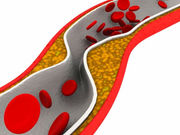No increase in treatment-emergent adverse event rates, neurocognitive events with low levels LDL-C
MONDAY, Jan. 30, 2017 (HealthDay News) — For patients treated with alirocumab, very low low-density lipoprotein cholesterol (LDL-C) levels are not associated with increased treatment-emergent adverse event rates, according to research published in the Feb. 7 issue of the Journal of the American College of Cardiology.
Jennifer G. Robinson, M.D., M.P.H., from the University of Iowa in Iowa City, and colleagues examined the safety of alirocumab in patients with at least two consecutive LDL-C values <25 or <15 mg/dL. Pooled data from 14 trials were analyzed, representing 4,029 alirocumab and 2,114 control double-blind patient-years’ exposure.
The researchers found that 25.1 and 9.4 percent of alirocumab-treated patients achieved two consecutive LDL-C values <25 mg/dL and <15 mg/dL, respectively. Patients with LDL-C <25 mg/dL versus ≥25 mg/dL had lower baseline LDL-C. Patients achieving LDL-C <25 mg/dL and <15 mg/dL had similar rates of adverse events (72.7 and 71.7 percent, respectively), compared with those who did not achieve LDL-C <25 mg/dL (76.6 percent). The three groups had similar neurological and neurocognitive events. The rate of cataracts was higher in patients with LDL-C <25 mg/dL versus ≥25 mg/dL in propensity score analysis (2.6 versus 0.8 percent, hazard ratio, 3.40). The incidence of cataracts, however, did not differ for pooled alirocumab and control groups.
“Low levels of LDL-C (<25 mg/dL) appear to be generally well tolerated over 18 months of alirocumab therapy,” the authors write.
Several authors disclosed financial ties to pharmaceutical and medical device companies, including Sanofi and Regeneron, both of which manufacture alirocumab and funded the analysis.
Copyright © 2017 HealthDay. All rights reserved.








